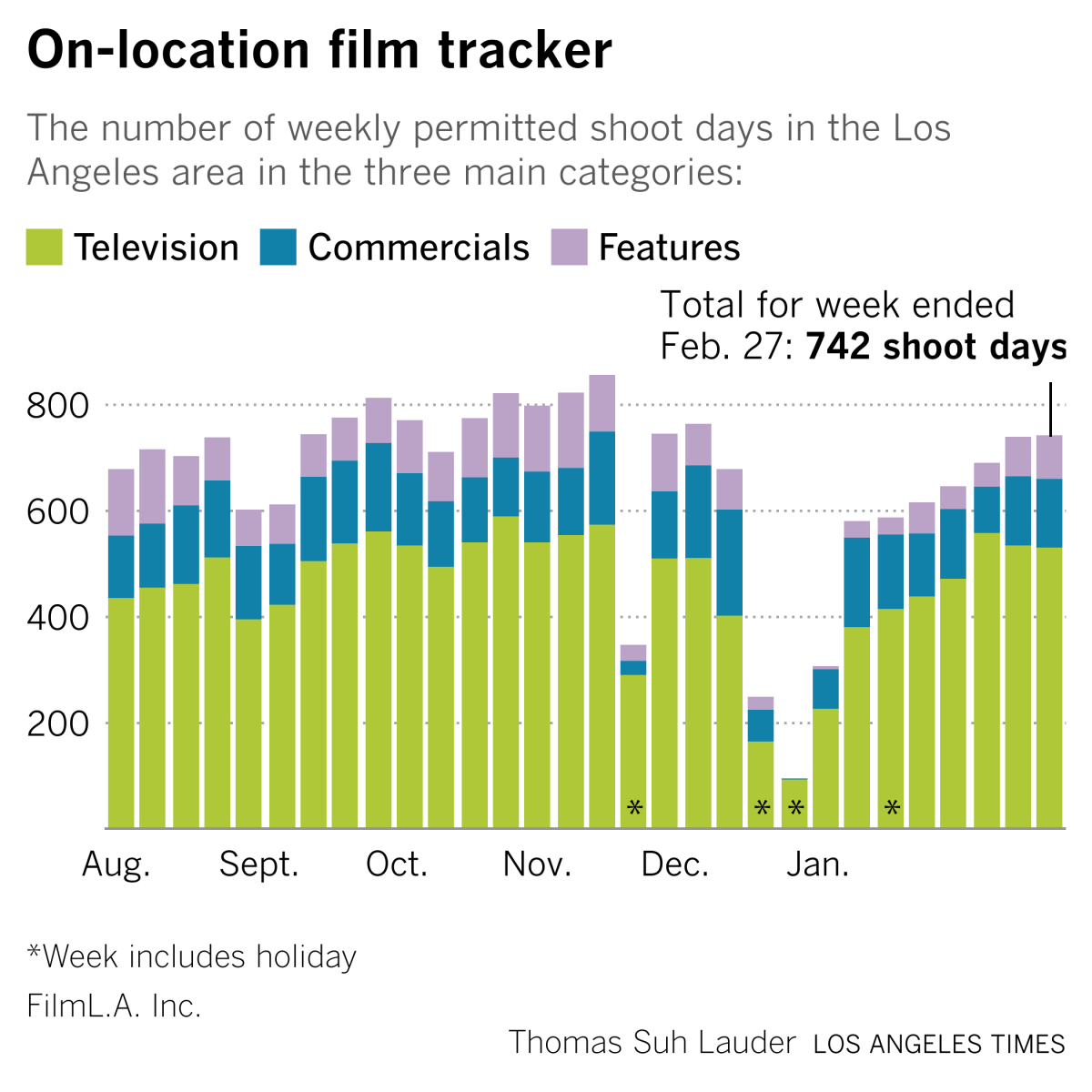‘Uncharted’ was a win for theaters. Now here comes ‘The Batman’

- Share via
Welcome to the March 1, 2022, edition of the Wide Shot newsletter about the business of entertainment. If this was forwarded to you, sign up here to get it in your inbox.
There are a lot of lessons one could take away from the better-than-expected box office run for “Uncharted,” Sony Pictures’ adaptation of the PlayStation video game series.
- With “Uncharted” and “Spider-Man: No Way Home,” Sony Pictures and Tom Holland, who was the star of both films, are on a roll. Holland has anchored the No. 1 movie at the domestic box office during eight of the last 11 weekends.
- It might be time to retire the notion of the “video game movie curse.” Sure, gaming adaptations haven’t had the consistency of superheroes at the box office. But there have been enough successes, including “Pokémon Detective Pikachu” and “Sonic the Hedgehog,” to justify this category as a viable source of intellectual property for film and television. Now let’s see that “Halo” series when it hits Paramount+.
- Theatrical exclusivity is huge. The fact that “Uncharted,” which earned mediocre reviews and was not a comic book franchise, could not be streamed or otherwise watched at home no doubt helped it exceed analysts’ box office expectations. Facing little competition, “Uncharted” grossed $23.3 million in its second weekend in release, marking a mere 47% drop from its three-day Presidents Day weekend debut.
I spoke with “Uncharted” producers Charles Roven and Alex Gartner of Atlas Entertainment about the film’s long road to the big screen, which started when they first approached Sony in 2008 and were paired with “Spider-Man” producer Avi Arad.
Here’s what I wrote:
The project struggled to get its sea legs. Video game adaptations were iffy propositions for the movie industry, with few examples of hits from which to draw. Early attempts to adapt “Uncharted” for the big screen took a faithful approach. An early script was stolen and leaked after the cyberattack on Sony Pictures’ computer systems. Directors including David O. Russell cycled in and out.
“Uncharted” risked becoming yet another botched Hollywood translation of a video game franchise, joining “Doom,” “Prince of Persia: The Sands of Time” and “Assassin’s Creed” in the pile of failures.
Finally in 2017, after a conversation with Holland, who was a fan of the game, Sony Pictures Motion Picture Group chairman Tom Rothman brought a new idea to the producers: Tell the origin story of main character Nathan Drake — normally in his 30s or 40s in the gaming universe — but make him a 20-something, with Holland playing the lead.
“It was sort of like a giant forehead slap for us,” Gartner said. “We were like, ‘Oh yeah, Tom Holland. Let’s go!’ And that kicked us off with a fresh start.”

Read the rest of my conversation with Roven and Gartner here. Atlas Entertainment also is producing “Oppenheimer,” by Mr. Movie Theater himself, Christopher Nolan, which is set to be released by Universal Pictures in 2023.
The success of “No Way Home” and “Uncharted” is only good news for Matt Reeves’ “The Batman,” which Warner Bros. will release this weekend. Analysts are expecting a debut of at least $100 million in ticket sales from the U.S. and Canada through Sunday, with the possibility of surpassing $125 million during its domestic launch.
That would make “The Batman” only the second pandemic-era movie to open with more than $100 million domestically, which would signal a new stage of the recovery for theatrical moviegoing in the sense that it would show “No Way Home” wasn’t a fluke.
Reviews have been generally positive for Robert Pattinson’s first outing as the Caped Crusader, with a 87% “fresh” rating on Rotten Tomatoes, though The Times’ Justin Chang said it was a mixed bag. This film will test, among other things, the audience’s appetite for an even darker Batman than Nolan’s version of the character.
We’ve read (and perhaps written) enough stories about the return of movie theaters to know not to count our batarangs until they’re back in our utility belt. The box office recovery is still being driven largely by young people, particularly young men, which doesn’t inspire much confidence that non-superhero, non-horror and non-video game action franchises will do much business in cinemas anytime soon.
Maybe the audience for adult-leaning movies will expand over time, as Roven and Gartner told me it would, as the most recent wave of the COVID-19 pandemic fades and even places like Los Angeles relax mask-wearing requirements. If Hollywood is lucky, that will happen by the time “Oppenheimer” comes out next year.
News and other stuff we wrote
— As Russia began its invasion of Ukraine on Thursday, local filmmaker Olga Zhurzhenko fled Kyiv, where she had been working on an animated feature, and drove to Odessa to be closer to her family. She was growing worried as she was joined on the roads by her colleagues and other Ukrainians leaving the capital city. Zhurzhenko spoke to The Times’ Anousha Sakoui last week about her hopes for the future of Ukraine’s film industry.
— Brian Contreras and Wendy Lee write that as bombs and missiles rocked Ukraine, “The internet quickly became a battlefield in its own right, with propaganda and disinformation threatening to muddy the water for Americans following the crisis from afar.”
— More on the conflict: How TV news is bringing the Russian invasion of Ukraine to living rooms and mobile devices. And actor Sean Penn wants the U.S. to help rescue Ukraine.
— Anime is big. Sony is moving shows including “Cowboy Bebop” from its Funimation service to Crunchyroll, the anime brand the company bought from AT&T last year for $1.175 billion. I spoke with Crunchyroll Chief Executive Colin Decker about the company’s bet on anime fandom.
— Dubbing has become crucial to Netflix’s business as the company finds more crossover success with international content like “Squid Game” and “Money Heist.” Wendy Lee takes an in-depth look at Netflix’s process of breaking the subtitle barrier. Getting the translation right has become more important than ever for the streaming giant.
— Meet the new boss: Discovery Inc. made it official Monday that veteran news and late-night producer Chris Licht will take over the reins of CNN in May, replacing Jeff Zucker. Licht will join the company after Discovery completes its acquisition of CNN parent WarnerMedia. Read Stephen Battaglio’s profile of “Captain Intense.”
Number of the week

The 2022 Winter Olympics (remember those happened?) averaged 11.4 million viewers across NBC’s networks in prime time, marking a record low for the Games and a 42% decrease from the 2018 Winter Games in Pyeongchang, South Korea, according to Nielsen data. It’s the second consecutive set of Games to hit an all-time low.
For context, the Olympics still had higher viewership than any non-NFL programming during the 2021-22 television season, Battaglio wrote in his analysis. The ratings decline reflects the fading audience for traditional broadcast TV and the fragmentation of a viewing population that simply has more options than ever before.
It didn’t help that this year’s Olympics were seriously lacking in fun hero stories among the athletes. There was, however, the very much not fun villain narrative, with host Beijing laundering its authoritarian image through a globally televised sporting event.
The ratings aren’t great for NBC, which in 2014 extended its deal to carry the Games through 2032 for $7.5 billion. However, NBC is looking on the bright side. NBC Sports Group Chairman Pete Bevacqua told Battaglio that viewing levels for Beijing were within what the network’s sales and research departments estimated. The Comcast-owned unit was able to satisfy all commitments to advertisers who bought commercial time in the Games, he said.
Also, the Games were good for Peacock, Bevacqua said, though he didn’t disclose figures for the service. Unlike the Summer Games, every Olympic event was available on the streaming platform and other Comcast streaming apps. There’s no doubt big entertainment and sports events drive bursts of subscriptions. But as we often say here, acquiring viewers is a fraction of the battle. The hard part is keeping them.

Coinbase’s Super Bowl snub
They say success has many fathers, but sometimes people like to claim sole custody of a big win.
Coinbase chief Brian Armstrong celebrated the company’s clever QR code Super Bowl commercial with a Twitter thread that suggested the whole thing was done in-house. In one tweet, he said the company rejected “a bunch of standard super bowl ad ideas” from an outside company. “No ad agency would have done this ad,” he wrote.
Except it looks like that’s not true? Kristen Cavallo, CEO of the Martin Agency, tweeted back to Armstrong that the idea may actually have been inspired by a presentation from her company featuring pitches that involved QR codes against a blank screen.
In response, Kate Rouch, Coinbase’s chief marketing officer, jumped in to explain that, actually, the ad was developed with an outside firm, Accenture Interactive, the digital arm of the major consultancy Accenture. But the teams worked so well together that “our CEO actually thought we were a single team when presenting work,” Rouch said.
Armstrong semi-walked back his earlier statement. Cavallo wrote in a LinkedIn post that the point of her tweet wasn’t to claim credit for the commercial, per se, but to defend the whole business of ad agencies.
You should be reading...

— Please stop trying to fix the Oscars. Bilge Ebiri makes an impassioned case that self-loathing with kill Hollywood’s biggest night. (Vulture)
— Why Joel Wachs let his life as a closeted gay politician be fictionalized in Paul Thomas Anderson’s Oscar-nominated “Licorice Pizza.” (LAT)
— Another fascinating music catalog-related deal. BlackRock and Warner Music invest $750 million in female and diverse artists, with a focus on seeking stakes in newer music copyrights. (WSJ)
— Is old music killing new music? I’m late to this Ted Gioia piece, which posits why the new-music market is actually shrinking, and it’s not because newer music is worse. (Atlantic)
— The New York Times hated crossword puzzles before it embraced them. Long before Wordle mania, there was the crossword puzzle craze. And newspapers around the world condemned them as an “invasive weed” that caused mental illnesses and even murder. (Big Think)
— Meet the “Netflix stan” who runs the site What’s on Netflix. Here’s what he’s learned about Netflix strategy, the new show he predicts will be a hit, and why HBO Max is his next target. (Insider)
Hollywood production
On-location filming continues to dig its way out of a COVID-shaped hole.

Finally...

“Flee” is a documentary from Denmark about a young man who escaped civil war in Afghanistan and tyranny in Russia while also coming to terms with his sexuality. It’s a remarkable film, and it’s nominated for Oscars in documentary feature, international feature and animated feature. Distributed by Neon, it’s available for streaming on Hulu and for digital rental in various places.
Inside the business of entertainment
The Wide Shot brings you news, analysis and insights on everything from streaming wars to production — and what it all means for the future.
You may occasionally receive promotional content from the Los Angeles Times.




